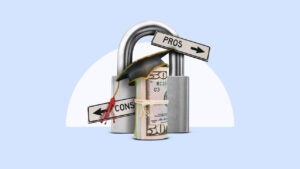Deferment vs. forbearance: Which is best for your student loan?

If you’re having trouble making your student loan payments, applying for a student loan deferment or forbearance could help you freeze payments temporarily while keeping your account in good standing.
The main difference between deferment and forbearance is that interest always accrues when you’re in federal forbearance, while deferment is interest-free in some cases. Generally, the question of whether to request forbearance versus deferment comes down to which you qualify for.
Key takeaways: Deferment vs. forbearance
- In federal student loan forbearance, interest continues to accrue. During deferment, interest accrual pauses if you have subsidized loans or Perkins Loans.
- The qualifying events for forbearance and deferment are different. Generally, they’re situations that temporarily reduce your income.
- If you qualify for deferment, your servicer must grant it. Forbearance is typically at your loan servicer’s discretion, but in some situations it is mandatory.
- Forbearance usually lasts for up to 12 months at a time, while deferment has differing lengths, depending on the type of deferment.
What is the difference between deferment and forbearance?
Both deferment and forbearance allow you to postpone student loan payments temporarily, but they differ in a few key ways.
For one, deferment on federal student loans must be tied to a qualifying event, such as going back to school at least half-time or experiencing financial hardship.
Forbearance, on the other hand, is usually tied to an event that causes a significant reduction in income. In some situations, your servicers can choose whether to grant forbearance. In others, granting it is mandatory — for example, if you’re in active duty in the National Guard or AmeriCorps. But regardless, eligibility is always determined by your loan servicer.
Additionally, interest accrues on all federal student loans during forbearance. For all types but Perkins Loans, the accrued interest will be added to the loan balance later, a process known as interest capitalization. This isn’t the case for deferment. While interest will still accrue on certain types of loans, other types of loans will not accrue interest during periods of deferment.
Deferment vs. forbearance: Federal student loans
| Deferment | Forbearance | |
|---|---|---|
| Length | Differs by deferment type | Up to 3 years, requested in installments of 12 months at a time |
| Qualification requirements | Unemployment, cancer treatment, military service, economic hardship and more |
General forbearance: Financial hardship or other reasons acceptable to your loan servicer
Mandatory forbearance: Registration for AmeriCorps, medical residency, National Guard and more |
| Interest accrual | Interest generally doesn’t accrue on Direct Subsidized Loans, Subsidized Federal Stafford Loans, Federal Perkins Loans, the subsidized portion of Direct Consolidation Loans or the subsidized portion of FFEL Consolidation Loans | Interest accrues and capitalizes |
| Credit impact | Will not impact your credit score but will be noted in your credit report | Will not impact your credit score but will be noted in your credit report |
Do private student loans offer deferment and forbearance?
While all federal student loans follow the same guidelines for forbearance and deferment, the rules are different for private student loans. If you have private student loans and you are looking for forbearance and deferment options, you should contact your loan servicer and find out what options it may have for you.
Not every private student loan servicer will offer forbearance options, but many offer options for loan forbearance if you meet certain requirements.
If you are looking for forbearance or deferment options on your private student loans, get all of the details upfront. Just like forbearance or deferment on federal loans, these options will be temporary. Understand the timeline your servicer offers for forbearance, as well as whether interest accrues during that time, to avoid any unpleasant surprises or dings in your credit.
What is student loan forbearance?
Federal student loan forbearance allows you to pause student loan payments for up to 12 months at a time, with a three-year cap.
Interest on your loans will accrue while you’re in forbearance. At the end of forbearance, your loan servicer will add unpaid interest to your principal balance, a practice called “capitalization.” This increases your debt, and interest will compound on a larger balance. The only type of loan not subject to capitalization is Perkins Loans — though interest still accrues on them.
There are two types of forbearance for federal student loans:
- General forbearance: This is granted at your loan servicer’s discretion. You may request this type of forbearance if you have financial difficulties, a change in employment, medical expenses or other hardships.
- Mandatory forbearance: The loan servicer must grant forbearance if you are enrolled in a medical or dental internship or residency, serving in the AmeriCorps, eligible for the U.S. Department of Defense Student Loan Repayment Program, paying more than 20 percent of your income toward federal student loans each month or eligible for teacher loan forgiveness.
The Department of Education may also implement periods of administrative forbearance, which applies to all federal student loan borrowers. This is the case with the coronavirus relief measures established in early 2020, which halts student loan payments and interest accrual on all federal student loans through Dec. 31, 2022.
If you have private student loans, forbearance may be available. However, forbearance options and eligibility differ for each private loan servicer. Talk to your loan servicer to learn more.
How to apply for student loan forbearance
To apply for federal student loan forbearance, you should use the applicable student loan forbearance form. There are forms for general forbearance and each type of mandatory forbearance. These forms work for all loan servicers.
Your servicer can guide you through the forbearance process and tell you about any other repayment options that it might offer. Contact your servicer to get started.
Note that you should keep making payments until your servicer confirms that you qualify for forbearance. If you stop, you may be considered delinquent, which can affect your forbearance application.
To apply for forbearance on private student loans, contact your loan servicer. The application process differs for each servicer. You’ll usually be required to produce documents proving financial hardship.
What is student loan deferment?
Federal student loan deferment also freezes your loan payments, but it comes with more perks than forbearance.
In some cases, the time frames are longer for deferment than forbearance. Plus, interest won’t accrue on Direct Subsidized Loans, Subsidized Federal Stafford Loans, Perkins Loans and the subsidized portions of Direct Consolidation Loans and FFEL Consolidation Loans. However, interest will accrue on other types of federal student loans in deferment.
Deferment is available if you are:
- Undergoing cancer treatment.
- Living on a monthly income less than 150 percent of your state’s poverty guidelines or receiving a means-tested benefit like welfare.
- Serving in the Peace Corps.
- Enrolled at least half time in an undergraduate or graduate degree program.
- On active-duty or post-active-duty military service.
- A parent who received a Direct PLUS Loan and your child is enrolled at least half time in school.
- Enrolled in an approved rehabilitation training program.
- Unemployed and unable to find full-time employment.
Similar to forbearance, deferment options for private student loans vary from servicer to servicer. Most grant deferment if you go back to school at least half time. Check with your private student loan servicer to determine your options for private loan deferment.
How to apply for student loan deferment
To apply for federal student loan deferment, contact your servicer or fill out a request for the specific type of deferment you’re pursuing. As with applying for forbearance, it’s important to continue making your payments until your servicer confirms that you qualify for deferment.
To apply for private student loan deferment, contact your lender to ask about options and to see if you qualify.
Which is better for me?
If you qualify for student loan deferment, it’s usually a better option. You may be able to freeze payments for longer than you would in forbearance, and interest won’t accrue if you have subsidized loans or Perkins Loans. But if you’re in financial trouble and there’s no deferment available, apply for forbearance.
But before taking the next steps, make sure you qualify for deferment or forbearance. You can’t apply for either option if your federal student loans are in default. You also must meet specific requirements for deferment or mandatory forbearance. Check the criteria before pursuing these options.
Alternatives to student loan deferment and forbearance
Student loan forbearance and deferment are temporary solutions that can help you through short-term hardship. But other options may be better for your situation and the long term.
Income-driven repayment
Income-driven repayment plans, such as Pay As You Earn and Revised Pay As You Earn, base your monthly student loan payments on your income and family size. After enrolling in one of these plans, your payments may become more manageable. In some cases, your payment could be as low as $0 per month. Income-driven repayment plans also come with loan forgiveness. If your loan isn’t paid in full after 20 or 25 years in repayment, the remaining balance is forgiven.
Student loan refinancing
Another option is refinancing your student loans. A strong credit history can help you qualify for a lower interest rate, which can lower your monthly payments.
You could also lower your payments by extending your term length, although that will result in more interest paid over the life of the loan.
Although refinancing may be a good option for private student loans, it isn’t advisable if you have federal student loans. When you refinance your federal student loans, they become private. You lose access to all of the borrower protections that come with federal student loans, including income-driven repayment plans, forgiveness programs and the current period of interest-free administrative forbearance for COVID-19.
Budget restructuring
Examine your monthly budget to see if you can eliminate any expenses to make more room for your student loan payment. Things like rent, utilities, your cellphone plan and groceries are critical. But things like cable bills, streaming services and gym memberships are not. If you’re having trouble identifying which expenses you can live without, a budgeting app could make this easier for you.
You might also consider making bigger changes, such as moving into a cheaper apartment or getting a side hustle in addition to your job, to improve your cash flow.
The bottom line
Student loan deferment and forbearance both allow student loan borrowers to hit pause on payments. Deferment sometimes offers more perks than forbearance, so if you’re having trouble making payments, this should be your first choice. If deferment isn’t available for your financial situation, apply for forbearance.
That said, both are short-term, temporary solutions, so you might need to find other ways to make room in your budget for student loan payments.
Why we ask for feedback Your feedback helps us improve our content and services. It takes less than a minute to complete.
Your responses are anonymous and will only be used for improving our website.
You may also like

Pros and cons of private student loans

Pros and cons of consolidating student loans




